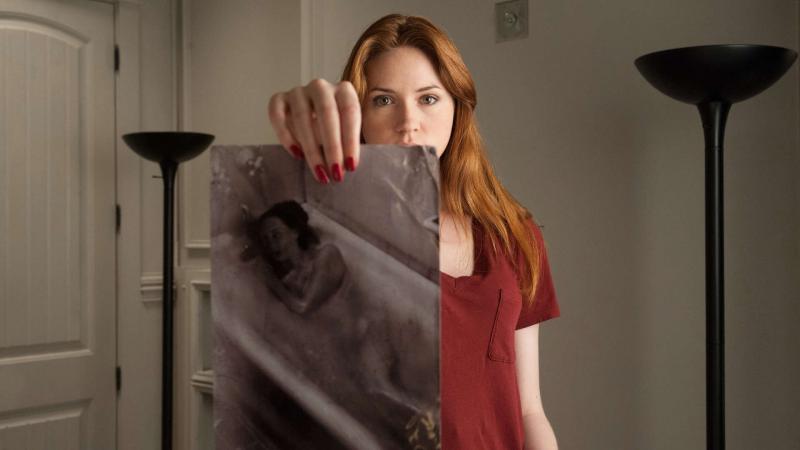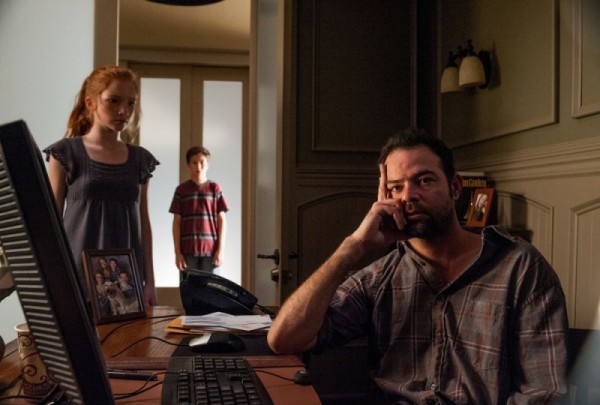Oculus | reviews, news & interviews
Oculus
Oculus
Karen Gillan's move from Who to Hollywoood begins with a clever, unscary horror

Karen Gillan’s first Hollywood leading role finds her in the surely unusual position of not liking what she sees in the mirror.
Director Mike Flanagan’s elaboration of his 2005 short of the same name tips one wink to Who fans, when statues seem to move in the mirror, much like the Stone Angels who haunted Amy Pond. Her genre past aside, Gillan convincingly holds the big screen as the stronger, cleverer, almost manically obsessed sister of Tim (Brenton Thwaites), impatiently awaiting her brother’s release from psychiatric care so she can drag him into a return bout with the mirror which put him there.
 Flanagan’s double-narrative follows Kaylie’s attempts to convince the fragilely healed Tim that the past he has been taught to remember rationally involved supernatural slaughter, and join her elaborate plot to destroy the mirror, and clear the name of their father. This requires returning to the family home where Dad’s actions had him posthumously declared insane, with Mum’s broken, toothless body as Exhibit One. Meanwhile, we follow Kaylie and Tim’s conflicting memories of the family’s fatal stay in the house.
Flanagan’s double-narrative follows Kaylie’s attempts to convince the fragilely healed Tim that the past he has been taught to remember rationally involved supernatural slaughter, and join her elaborate plot to destroy the mirror, and clear the name of their father. This requires returning to the family home where Dad’s actions had him posthumously declared insane, with Mum’s broken, toothless body as Exhibit One. Meanwhile, we follow Kaylie and Tim’s conflicting memories of the family’s fatal stay in the house.
The disintegrating marriage of Marie and Alan Russell (Katee Sackhoff and Rory Cochrane, the latter pictured above right with Annalise Basso and Garrett Ryan as young Kaylie and Tim) might be due to her fears over her pregnancy-scarred body and his possible unfaithfulness, and his overwork in the study where he spends so much time. Or it might be to do with the black-framed antique which dominates that study: what the adult Kaylie calls the Lasser mirror, after its first known, 18th century owner. Lasser, like many subsequent purchasers, was mentally and physically shredded by its reflections. Sackhoff and Cochrane’s sober descent into flesh-rending insanity, to the horror of their helpless children, recalls The Shining. The mirror, and the grinning female succubus which crawls out of it to lean over Alan at his desk, is the snow walling them into their madhouse.
 The adult Kaylie has prepared a cunning trap for her nemesis. But as past and present narratives become blurred mirror-images, time and space play tricks, and it becomes impossible for the traumatised siblings to believe their eyes or ears, her hubris becomes clear. It’s also about now that Flanagan’s well-acted, emotionally involving film loosens its grip. With a great horror talent such as the Merseyside writer Ramsey Campbell, reality losing its moorings remains a distressingly real experience. Oculus’s hall of mirrors becomes a fairground ride spinning out of control. The upsetting, intimate disturbance of the haunted house, where the safety of family and home are upended, has fuelled many frightening films. The monster mirror which infects the Russells’ unhappy home ends up as just another funhouse trick.
The adult Kaylie has prepared a cunning trap for her nemesis. But as past and present narratives become blurred mirror-images, time and space play tricks, and it becomes impossible for the traumatised siblings to believe their eyes or ears, her hubris becomes clear. It’s also about now that Flanagan’s well-acted, emotionally involving film loosens its grip. With a great horror talent such as the Merseyside writer Ramsey Campbell, reality losing its moorings remains a distressingly real experience. Oculus’s hall of mirrors becomes a fairground ride spinning out of control. The upsetting, intimate disturbance of the haunted house, where the safety of family and home are upended, has fuelled many frightening films. The monster mirror which infects the Russells’ unhappy home ends up as just another funhouse trick.
The future of Arts Journalism
You can stop theartsdesk.com closing!
We urgently need financing to survive. Our fundraising drive has thus far raised £33,000 but we need to reach £100,000 or we will be forced to close. Please contribute here: https://gofund.me/c3f6033d
And if you can forward this information to anyone who might assist, we’d be grateful.

Subscribe to theartsdesk.com
Thank you for continuing to read our work on theartsdesk.com. For unlimited access to every article in its entirety, including our archive of more than 15,000 pieces, we're asking for £5 per month or £40 per year. We feel it's a very good deal, and hope you do too.
To take a subscription now simply click here.
And if you're looking for that extra gift for a friend or family member, why not treat them to a theartsdesk.com gift subscription?
more Film
 Nickel Boys review - a soulful experiment
Pulitzer-winner becomes an immersive elegy to black teenage crime and punishment
Nickel Boys review - a soulful experiment
Pulitzer-winner becomes an immersive elegy to black teenage crime and punishment
 Best of 2024: Film
theartsdesk's movie critics pick their favourites from the last 12 months
Best of 2024: Film
theartsdesk's movie critics pick their favourites from the last 12 months
 Best of 2024: Blu-ray
The pick of the year's releases: films spanning decades, continents and genres
Best of 2024: Blu-ray
The pick of the year's releases: films spanning decades, continents and genres
 Nosferatu review - Lily-Rose Depp stands out in uneven horror remake
Robert Eggers leaves his mark on adaptation of classic, but it’s not always for the best
Nosferatu review - Lily-Rose Depp stands out in uneven horror remake
Robert Eggers leaves his mark on adaptation of classic, but it’s not always for the best
 Blu-ray: Hitchcock - The Beginning
A box set shows how Alfred Hitchcock embraced the sound revolution – pathologies intact
Blu-ray: Hitchcock - The Beginning
A box set shows how Alfred Hitchcock embraced the sound revolution – pathologies intact
 Wallace & Gromit: Vengeance Most Fowl review - an old foe returns
Stop-motion animation on an epic scale
Wallace & Gromit: Vengeance Most Fowl review - an old foe returns
Stop-motion animation on an epic scale
 Blu-ray: Three Wishes for Cinderella
Witty, engaging Czech fairy tale with an appealingly feisty heroine
Blu-ray: Three Wishes for Cinderella
Witty, engaging Czech fairy tale with an appealingly feisty heroine
 Bogart: Life Comes in Flashes review - a Hollywood legend, warts and all
A documentary portrait of Bogie toes the official line but still does him justice
Bogart: Life Comes in Flashes review - a Hollywood legend, warts and all
A documentary portrait of Bogie toes the official line but still does him justice
 Sujo review - cartels through another lens
A surprisingly subtle narco pic from Mexico
Sujo review - cartels through another lens
A surprisingly subtle narco pic from Mexico
 Queer review - Daniel Craig meets William Burroughs
Luca Guadagnino's film is crazy but it just might work
Queer review - Daniel Craig meets William Burroughs
Luca Guadagnino's film is crazy but it just might work
 The Lord of the Rings: The War of the Rohirrim review - a middling return to Middle-earth
JRR Tolkien gets the anime treatment
The Lord of the Rings: The War of the Rohirrim review - a middling return to Middle-earth
JRR Tolkien gets the anime treatment
 The Commander review - the good Italian
Chivalrous valour at sea from a real World War Two hero
The Commander review - the good Italian
Chivalrous valour at sea from a real World War Two hero

Add comment